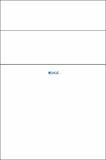| dc.description.abstract |
This study testers the generalizability of agenda-setting theory in less developed democracies by analyzing data on public opinion, television news coverage, presidential policy, and real-world indicators from Chile between 2000 and 2005. After tracking attention to five different issues—crime, unemployment, health, poverty, and education—we estimate both average and issue-specific agenda-setting effects using time-series, cross-sectional ordinary least squares (OLS) regressions. The results show that there are multidirectional influences between the public, television news, and the president. Both the public and the president appeared responsive to prior news coverage and while news coverage was not influenced by public attention, it was affected by presidential rhetoric. While these processes differed from one issue to another, overall there was a top-down pattern of agenda adoption: Policy preferences are “negotiated” between the president and the news media, with no noticeable input from the public. From a comparative perspective, the evidence shows that television news in Chile are considerably powerful and that citizens’ priorities are basically ignored by the elites, although their maneuvering is still constrained y objective conditions. |

